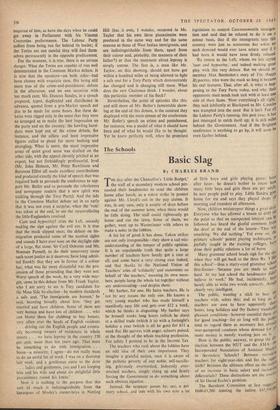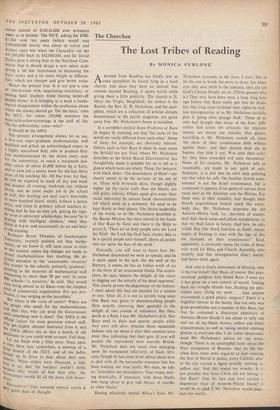The Schools
Basic Slag
By CHARLES BRAND THE day after the Chancellor's 'Little Budget,' the staff of a secondary modern school per- suaded their headmaster to send the children home after lunch, as a token strike in protest against Mr. Lloyd's cut in the pay claims. It was, in any case, only a couple of days before the end of the summer term, when there would be little doing. The staff could righteously go home and cut the lawn. Some of them, we gather, went up to Westminster with others to make a noise in the lobbies.
A fat lot of good it has done. Token strikes are not only irresponsible—they show a sad mis- understanding of the temper of public opinion. It is an unpalatable truth that quite a large number of teachers have barely got a case at all, and some have a very strong case indeed, and that thanks to the National Union of Teachers' cries of 'solidarity' and statements on behalf of 'the teachers,' meaning its own mem- bers, people lump the whole lot together without any understanding--and despise them.
My barber, for one. He hates teachers. He is not by any means the only one. He knows a very young teacher who has made himself a manifestly easy life and gets over £12 a week, which he thinks is disgusting. My barber says he himself works long hours (which he does) at a skilled trade (which it is) with a fortnight's holiday a year (which is all he gets) for £11 a week flat. He quivers with anger, scissors poised, at the thought of the whole teaching profession. For safety I pretend to be in the Income Tax.
The teachers who rush about the lobbies have an odd idea of their own importance. They imagine a grateful nation, once it is aware of the pathetic poverty of our noble, self-sacrific- ing, grievously overworked, hideously over- strained teachers, simply rising up and firmly forcing the Government to do something about such obvious injustice.
Instead, the taxpayer passes by, say, a pri- mary school, and sees with his own eyes a lot of little boys and girls playing games h, after hour: he doesn't bother to count h many little boys and girls there are per adt he sees people paid to play. Little Sandra gi home for tea and says they played shops morning and rounders all afternoon. Now, children misinterpret things a great deal' Everyone who has allowed a lesson to drift 01) the point so that an unexpected interest can be followed has heard the gleeful comment froill the door at the end of the lesson--`That v 35 smashing. We did nothing.' Yet even so, I be primary schools' patent playing techniques, 5° joyfully taught in the training colleges, Iv ve done their public relations a lot of harm.
Many grammar school heads sigh for the when they will get back to the three Rs. 'I like this school'—thus a starry-eyed grammar sell' °I first-former---`because you are made to W4r/' hard. At my last school the headmaster didn't believe in • work.' He had, incidentally, beep barely able to write two words correctly, thot clearly very intelligent. The public, wanting a stick to beat the teachers with, seizes this; and as long as 311 teachers are seen to have apparently 0' rt hours, long holidays and (by factory standards) pleasant conditions—however essential these are for good teaching—for so long will the public tend to regard them as necessary but alreaa over-pampered creatures whose demand for yet more money is merely wanting jam on it How is the public, anyway, to grasp the (l tinction between the NUT and the AMA-1 Incorporated Association of Assistant Mast' in Secondary Schools? Between recruits teachers for eight-year-olds and for the opt sixth? Between the ultimate effect on the roll of an increase in bask salary and incrcasi differentials? These distinctions are the cvc1 of Sir David Eccles's problem. The Burnham Committee at last sugeol 160041,200 (costing the nation £47,500,C
ur oW
It; es all
al extra) instead of 020-£1,000 over seventeen Years as at present. The NUT, asking for £700- £1,300 over ten years (which would cost £100,000,000 more), was about to refuse and declare open war when the Chancellor cut the £47,500,000 back to £42,000,000, and Sir David Eccles gave a strong hint to the Burnham Com- mittee that it should design a new salary scale giving a lot less importance to increasing the basic salary and a lot more weight to differen- tials, which are cheaper and give better value.
Hence the present fuss. It is not just a case 01 interference with negotiating machinery or cutting back teachers while leaving better-off People alone: it is bringing to a head a funda- mental disagreement within the profession about Where the money should go. 'On the basic,' cries the NUT, for whose 230,000 members the basic-with-a-few-trimmings is the staff of life. On the differentials,' cries—who?
It should be the AMA The present arrangement allows, let us say, a first-rate super-graduate mathematician, well qualified and gifted, an acknowledged expert in a highly specialised field, able to produce first- rate mathematicians by the dozen every year for the universities, to reach a maximum pos- sible salary of about £1,600 before he is forty, and to earn not a penny more for the last thirty Years of his teaching life. All that time, for that, he will be expected to teach all day and mark a nd prepare all evening,. weekends too, without let-oP, and do some major job in the school as well, like working out next year's time-table (a mere hundred hours' work), without a penny, extra, and listen to primary school teachers in- sisting that he has an easy job, getting his regu- lar crop of university scholarships, because 'he is Beating with intelligent children,' while they finish at 4 p.m. and occasionally do an odd hour In the evening. Professor Bryan Thwaites, of Southampton University, recently pointed out that mathe- matics, as we know it, will soon cease to exist in this country unless big changes are made to attract mathematicians into teaching. He di- rected attention to the 'catastrophic situation' "Iis Words) 'in the schools, primarily grammar,' Pointing to the turnover of mathematical staff 04_11tounting to more than 50 perin some °u0 schools—`a turnover,' he said, e 'that would 3,?°11 bring almost to its knees even the simplest Ind of commercial organisation. For any pro- fession it was verging on the incredible.' But where is the voice of sanity? Where are the people who speak for the mathematicians and their like, who can prod the Government 161 something new is done? The AMA is the "in, cial 'union' for most grammar school staff, htto get slightly cheaper insurance from it, and e AMA officers are as nice a bunch of old gentlemen as you could wish to meet. Full Stop. IL.el me finish with a little story. Once upon 140 time there was, somewhere, a meeting of a eal branch of the NUT, and all the ladies sai up in force to hear about their new aries. When strikes were discussed, a lady bee to say that 'the teachers' couldn't strike r, because they would all lose their jobs: the -.Joy wives ernment would fill all the posts with house- noasewives ! That innocent remark merits a erY great deal of thought.







































 Previous page
Previous page